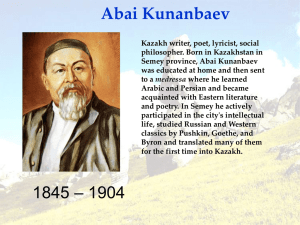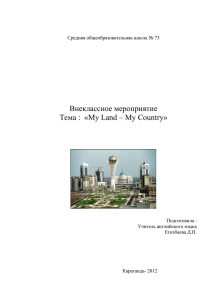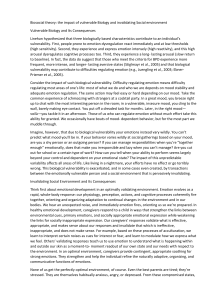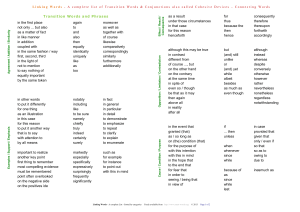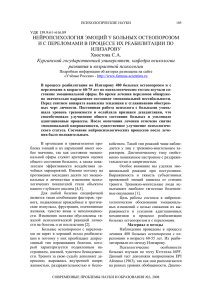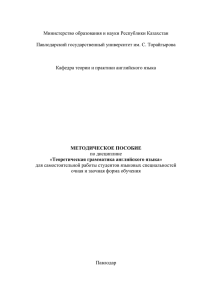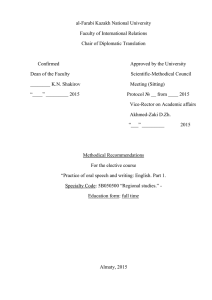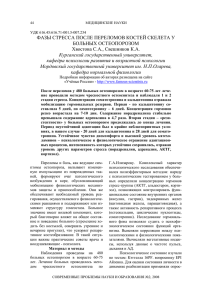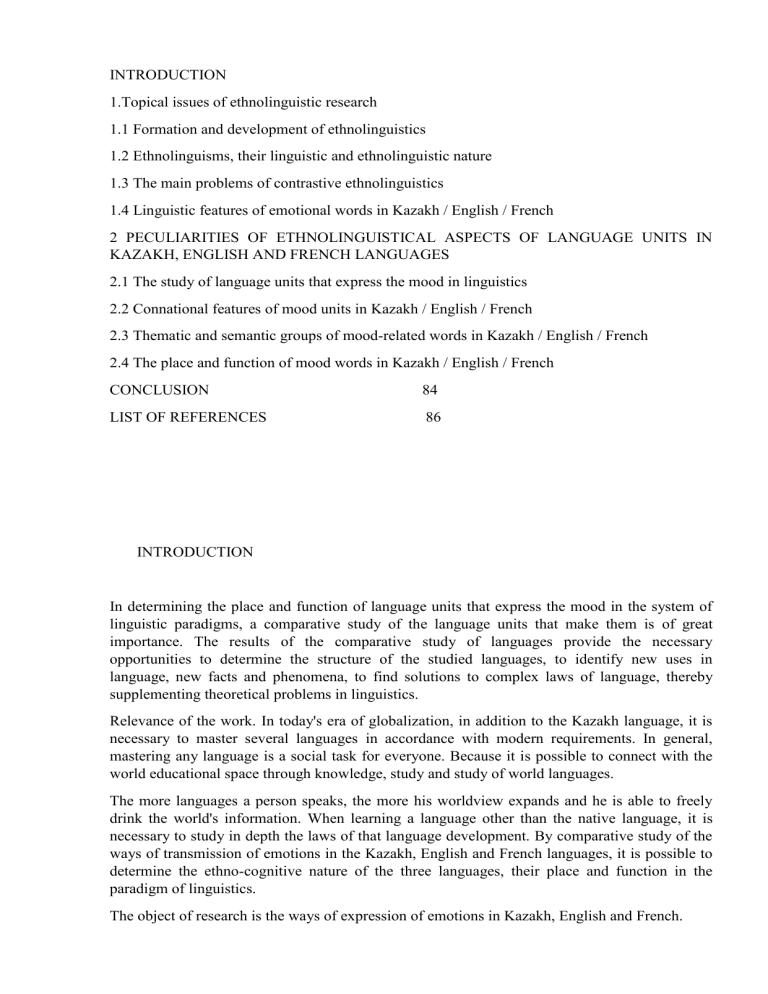
INTRODUCTION 1.Topical issues of ethnolinguistic research 1.1 Formation and development of ethnolinguistics 1.2 Ethnolinguisms, their linguistic and ethnolinguistic nature 1.3 The main problems of contrastive ethnolinguistics 1.4 Linguistic features of emotional words in Kazakh / English / French 2 PECULIARITIES OF ETHNOLINGUISTICAL ASPECTS OF LANGUAGE UNITS IN KAZAKH, ENGLISH AND FRENCH LANGUAGES 2.1 The study of language units that express the mood in linguistics 2.2 Connational features of mood units in Kazakh / English / French 2.3 Thematic and semantic groups of mood-related words in Kazakh / English / French 2.4 The place and function of mood words in Kazakh / English / French CONCLUSION 84 LIST OF REFERENCES 86 INTRODUCTION In determining the place and function of language units that express the mood in the system of linguistic paradigms, a comparative study of the language units that make them is of great importance. The results of the comparative study of languages provide the necessary opportunities to determine the structure of the studied languages, to identify new uses in language, new facts and phenomena, to find solutions to complex laws of language, thereby supplementing theoretical problems in linguistics. Relevance of the work. In today's era of globalization, in addition to the Kazakh language, it is necessary to master several languages in accordance with modern requirements. In general, mastering any language is a social task for everyone. Because it is possible to connect with the world educational space through knowledge, study and study of world languages. The more languages a person speaks, the more his worldview expands and he is able to freely drink the world's information. When learning a language other than the native language, it is necessary to study in depth the laws of that language development. By comparative study of the ways of transmission of emotions in the Kazakh, English and French languages, it is possible to determine the ethno-cognitive nature of the three languages, their place and function in the paradigm of linguistics. The object of research is the ways of expression of emotions in Kazakh, English and French. Subject of research – ethnolinguistics. The purpose of the study is a comprehensive study of ethnolinguistic aspects of the transmission of emotions in the Kazakh, English and French languages. To achieve this goal, the following tasks were set: Review of ethnolinguistic research, focus on the linguistic, ethnographic nature of ethnolinguistics; Study of connotational features in the cognition of the three nations through a comparative study of the ways of transmission of emotions in the Kazakh, English and French languages; Analysis of semantic-thematic groups of words related to human mood in Kazakh, English, French; Determine the relevance of mood units in word groups in the Kazakh, English, French languages; The research material was obtained as a result of mass sorting and consists of a card index of about 150 units in Kazakh, English and French. Sources of research: works of art in Kazakh, English, French, poetic texts, proverbs, phraseologies in Kazakh, English, French, «Explanatory dictionary of the Kazakh language», «Dictionary of the Kazakh literary language», I.K. Kenesbayev's «Phraseological dictionary of the Kazakh language», «Phraseological dictionary of the French language», «Explanatory dictionary of the French language», «Great French dictionary», «Explanatory dictionary of the English language», «English-Russian translation dictionary», etc. Research methods. Comparative, descriptive, contrasting, typological methods were used in the work. The method of mass sorting was used to collect the actual material. As a theoretical basis for the study, prominent representatives of ethnolinguistics A. Kaidar, I. Копыленко, Е. Жанпейісов, Р. Line, n. Уәлиұлы, Б. Қалиев, Э. Suleimenova, Zh. Манкеева, Р. Avakova, etc. Along with his works on the problem of connotation and expressiveness of words. Kaidarov, G. Мұсабаев, Ф. Musabekova, A. Болғанбаев, М. Sergaliev, A. Nurmukhanov, Sh. Nurgozhina, etc. The works of scientists were followed. Scientific novelty of the research: Ethnographic expression of mood expressions in the Kazakh, English and French languages leads to the creation of a linguistic image of the world in the cognition of the three nations, and thus the recognition of the essence of the three nations. Theoretical significance of the work. A comparative study of language units that express mood as one of the main aspects of the manifestation of the spiritual sphere of man allows us to identify specific features of their appearance and manifestation in the Kazakh, English, French mentality. It is theoretically important to pay attention to the study of the ways of transmission of emotions in the images of the Kazakh, English, French national world, because they are, first of all, one of the manifestations of consciousness and self-consciousness of Kazakh, English and French speakers. Practical value of the work. The main findings and results of the research can be used in the theory and practice of teaching Kazakh, English, French, special courses such as linguocultural studies, introduction to the theory of language and ethnicity, intercultural communication, lexicography, as well as linguistic research. The scope and structure of the work. The work consists of an introduction, two chapters, a conclusion and a list of references. 1.1 Features of emotional words in the Kazakh / English / French languages at the language level Man is a part of nature. Undoubtedly, various natural phenomena have a positive effect on a person's mood. That is, it can make a person happy or sad or happy. The resulting joy, sorrow, fear, fear, excitement, remorse – these are the manifestations of different feelings and emotions. Emotion - the French word "emotion", from the Latin "emovere" means to excite, to excite. That is, it is a manifestation of human mental activity. In other words, human beings do not perceive the world around them and its various phenomena in any way, but evaluate it differently. He likes some actions and dislikes others [49]. Emotion is the reality of a person's life around him and his own attitude to himself. Objects and phenomena that exist in the objective world, the actions performed, the changes taking place in our body Emotion expresses mood, feeling, and expression is the intensification of this mood feeling. М. «There is a semantic distinction between emotion and expression,» Orazov said. But it is typical of psychology and linguistics. Where there is emotion, there is expression. It is clear that expression helps to determine the origin of emotions «[37, 107]. Emotions are subjective. Concepts such as good and bad, joy and sorrow, laughter and weeping, curse and gratitude, pleasure and pain, bitterness and sweetness are born from a comparative assessment of the nature of things and phenomena in the world. Emotion is a phenomenon inherent in the process of expressive speech. Modality is an element that expresses the speaker's point of view on a message in any environment. Words that have an emotionally-expressive meaning in the language are called emotionallyexpressive vocabulary. The scope of such words is not wide. They evaluate objects and phenomena in comparison with the narrator's or writer's assessment of the object or phenomenon. Academician A. Kaidarov said: directly related to the assessment «[3, 181]. Word groups in the Kazakh language are nouns or semantic words (знаменательные слова), auxiliary words (служебные слова), and sometimes a third group – synonyms is added to it. Emotional-expressive meaning is manifested to varying degrees in word classes. М. Orazov writes that «emotional-expressive meaning appears in adjectives as the basis of the lexical meaning of the word (nominative), in nouns and verbs it is known as an adjective (connotative) or as a manifestation of denotative meaning» [37, 115]. Emotional-expressive signs apply to all areas of language. We find it in the sound, word system and grammatical structure of the language. The emotional-expressive phenomenon in language is especially evident in the semantics and stylistic usage of allies. Emotional-expressive vocabulary is also present in nouns. Emotional-expressive words in Kazakh, English and French nouns can be divided into two groups: 1. Words used in connection with a person's high mood: joy, gladness, pleasure, laughter, friendship, kindness, dignity, respect. 2. Words that express a person's mood: grief, sorrow, grief, resentment, resentment, anger, resentment, honor, evil, wickedness. In the same way, the second group of emotionally-expressive nouns can be used to express the resentment and dissatisfaction of a person, such as a scoundrel, a scoundrel, a scoundrel, an abomination, a slanderer. In our language, there is a tradition of adding morphological elements, such as -zhan, -tai, to younger and younger children when celebrating and enthusiastically speaking to them. For example, if a child's name is Marat, Bolat, he is called Maratzhan, Bolatzhan, Amir, Amirzhan. For example, Ulzhan Abai, who had just wiped his breath, looked at the high table where he was sitting and understood his son's situation: - Abayzhan, haven't you slept all night? – He looked at his son's face. In this sentence, we notice the mother's attention to her child, the mother's quick-wittedness and anxiety about her child's feelings. A.A. Akkozov: “Scientists do not always agree on the emotional meaning of linguistics [52]. For example, V.A. Zvegintsev believes that the emotional meaning is not included in the meaning of the word, so it belongs to the object of study in the field of stylistics, not semiotics. Al, M. «Both the emotional and the figurative meaning are perceived by the senses through the senses and become part of the meaning of the word through the senses,» says Orazov. In our opinion, it is better to analyze the origin of the meaning of the word to reveal the secret. Because when a denotative meaning appears, it is directly related to the objective world. In epistemology, there is a principle that knowledge of the world begins with intuition. If a person's senses are not sensed, they will not be recognized by man, and will not appear in words as the names of things. For example, a blind person cannot tell the difference between black and white. But once people have spoken and explained it, it is clear that they know the nature of black and white words. This explains why a deaf person cannot tell the difference between the sound of a nightingale and the sound of a cannon. It is not to be understood that human beings in perceiving the world receive only their «pure» copy through the senses. You left the column, you were wandering around, surname (T. Mameseitov); The main lexical meaning of the words «this dog is barking» (M. Auezov) is «emotional-expressive», which means that the speaker does not like it and creates negative emotions. Fear. Feelings, fears, anxieties that arise when you are afraid of something. For example, in the Kazakh language: The frightened child cries out as if caught in a fire (M. Auezov). The child, who cries out in fear, cries out as if caught in a fire. (M. Auezov. Abai) In the middle of two fires, Zhanai flame, Passion whispers a dance song, Fear comes with passion, He does not understand what happened. (I. Baizakov. Kuralai) Forgetting all her fears, the girl hid under the table and held the folded notebook in Niyaz's hand. (T. Akhtanov. Storm). Because fear is a special force and threat that can frighten a person, the following synonyms can be found: Fear – He was worried about whether he had been kidnapped by Zaure (O. Kanakhin). Kut – Kuti ran away not knowing what to say tomorrow (A. Suleimenov). Urine – When I crossed the ridge and reached the ground like a small sheep with a thick hooves, my urine went to the bottom – he said (K. Abdykadirov). In English: Fear, fright; terror, awfully, terribly, danger, funk, anxiety,trepidatior, awe, fright деген сөздер қорқыныш мағыналарын береді. Мысалға: Fear brought people to God! Like most Americans in the first decade of the new century, Hutch feared everything except what he ought to fear. Frustration and fear for us burned through her. Now man loves life, because he loves pain and terror, and so they have done according. He felt a pang of mingled regret andterror. Her guts liquid with absolute fright, she turned and ran [63]. In French: Horreur Peur de la mort Intrépide Effrayé Resentment – in the Kazakh language, frustration, sadness, sighing, tiredness, sadness, resentment, resentment, pity. Achieved the goal They are looking for support. I have the same lungs The same resentment! (K. Myrzaliev. Eternal Front) Not listening to the word, not evaluating, The dog is crooked and stubborn He frowned and looked away: «Stay away»! – he said After all, all relatives are close (works of M. Zhumabayev). In English: grievance, hurt, injury, insult, offence. This is an insult again. This was such an insult! No offence to you, Master Flinty-heart, but you keep desperate evil company. «Sir»! said that being in a state of great offence, «in my position I am not used to having my favours refused. My experience was very limited; I was not at all prepared for his rousing himself out of this emotion to a new sense of injury. In French: Ressentiment, intimidation, intimidation Il intimide souvent les enfants plus jeunes que lui. Harcèlement arbitraire. Si je ne tue pas le villageois de Zhuge, comment puis-je arrêter les griefs dans mon cœur? In the Kazakh language, for example: archetype common to all verbs come, go, go away, bile – the movement of the object from one place to another, the movement. They have differential semaphores that distinguish them from each other. The verbs come and go mean moving in the opposite direction, while the verb far is long and distant. The verb of rotation refers to the movement around an object, while the verb bile refers to the movement associated with various obstacles [57, 346]. In English, the following verbs are used to express mood: In English: be ashamed, sham, humiliated, ascamian. Displaying everything condemns cinema to clichе, obliges it to display things as everyone is in the habit of seeing them. Failing which, they would appear false or sham (Robert Bresson). In French: Poli, timide, retenu, détesté, désolé деген етістіктер арқылы беріледі. Grief is one of the verbs that express mood. Its main meaning is a sign of sadness and sadness. Phraseologisms about grief in the Kazakh language: as if his father died; lumbar flexion; frostbite on the hips; lying on the ground; heart (loss of chest); burning heart; injection into the heart; chest full of tears; sad chest, tears; wall bending; poisoning from grief, swallowing; swallowing blood with grief; yellow anxiety; swallowing a lion; heartburn; nausea; lion's chest; burning in the abdomen; etc. In English grief, suffer (from), be subject (to), lade (with). To come to grief, to bring to grief, to suffer disappointment, misfortune, or other trouble; I tell you, hopeless grief is passionless; That only men incredulous of despair, Half-taught. In anguish, through the midnight air Beat upward to Gods throne in loud acces of shrieking and reproach (Elizabeth Barrett Browning). That's all over. There's no need to grieve about it. As imperceptibly as grief The Summer lapsed away (Emily Dickinson). «Listen, said I, hardly knowing how to begin: «Don't grieve over Azorka. «It's all the cruel-hearted villains! Anna Andreyevna went on, «well, tell me about my darling. Is she grieving and crying?» How many will have ceased to suffer before then? In French: Triste ; très douloureux, inconfortable, triste, perdu қайғыруды білдіреді. Soyez désolé pour l'ami malade. Les travailleurs avaient faim et froid avant la libération. [ 66] Surprise. 1. To be surprised is to not be able to understand someone's thoughts. 2. Whispering – amazement, admiration. 3. Making water in the mouth – amazement, amazement. 4. Mouth opening – amazement, surprise, astonishment. 5. Opening his mouth – surprise, astonishment, astonishment. 6. Knocking – surprise, amazement. 7. To be amazed (to stay) – to be surprised, astonished. 8. Feeling down. Manifestation in a work of art in the Kazakh language: Bill gave way to his master. Then he saw his feet and was astonished: «Oh, Adam Khan. Or did my name change, or did you have four legs? – says. - How much does he need? Will you go to god Anyway, the country is talking about the recent miracle, - he said (excerpt from the fairy tale). - At that moment, everyone in the yard was speechless. In English: «Wonder» – to my great surprise, be open-mouthed with astonishment / surprise, what a wonder! To look in open-mouthed wonder, I wondered at her saying that, A wonder lasts but nine days (In English proverbs). «I wonder at you, Liputin; whenever there's anything nasty going on you're always on the spot taking a leading part in it», I said angrily. I’ll believe it when pigs fly! «I think it’s wonderful», said Melanie softly. Are you shitting me? I can’t believe it! You must be joking! In French таңқалу мына сөздермен сипатталады: Étrange, surpris, surpris, surpris, très bien, super, vraiment surpris, suscité la surprise, j'ai été surpris de trouver, non ! Oreilles chaudes et éblouissantes Les yeux sont éblouissants et les oreilles sont chaudes. Décrit le sentiment d'être légèrement ivre et excité en buvant de l'alcool. Encouragement : encouragement, excitation ; joie : joie et excitation. Décrit très heureux et excité. Fierté et Yizhi Pride : se réfère aux sentiments d'excitation et d'audace ; Yi : super étape ; Yizhi : goût tranquille et raffiné. Fait référence à une émotion sans retenue et à un goût libre et facile. [67] Pampering. 1. To show affection to an adult, to squint, to squint.2. Love to be free, to be proud, to be proud, to be selfish. Synonymous series of the word «pampering» in the Kazakh language include the following words: review; pampering; caress; caress; aspiration; lioness; lioness; etc. In English: be naughty – еркелеу, be affected – наздану, flirt – наз көрсету, get up to tricks – тәлпіштену, behave capriciously – шолжаңдау, т.б. In French: Vous la boue, la jouissance, la paresse Il profite de Yueguang Vivez une vie prospère et confortable Il profite de Yueguang Anxiety (gr. Panihon – causing fear) – mass anxiety from false or real dangers. Fear is a decrease in moral and psychological mood, mental strength, decreased perception, increased activity of the mechanisms of imitation, erratic movement, deception. Anxiety is a state of mind that results from anxiety and worry in a particular social setting, as a result of a person's over-exposure. In the Kazakh language, the synonymous lines of the word «fear» are words such as fear, fear, kut (escape). For example: The village woke up smoothly because of Kultai's frightened voice (Imanalieva). Talib looked at her face in horror (Bokaeva). - Drag and look at the frightened (Tokayev). - Courage, cowardice, panic are alien to the spirit of warriors (B. Momyshuly). - He is light-hearted and timid by nature (O. Sarsebayev). The following phrases related to fear are used in the Kazakh language: He was frightened, he was threatened. Frightened – very scared. Fear fled – there was no panic left. Alai – frightened, scared, frightened, blinded. Tragedy is fear. Screaming is a frantic, frightening gesture. Atyzdai (his eyes were like atyzdai) – he was scared and frightened. Fear is a feeling that arises when you are afraid of something. Where there is fear, there is no hope … It's scary … Fear you, and fear you. In English be afraid (of); fear; dread, panic, frightened. Мысалы: What have I to be afraid of… ? Had he anything to fear from them? But it was you I ought to have been afraid of, Yang ! «Why should I fear you?» said the lady, withdrawing her hands from her beautiful face, which was now covered with crimson. In French Avoir peur сөздері қорқу деген мағына береді. Мысалы: Il n'y a rien d'effrayant. De quoi as-tu peur? L'un n'a pas peur des épreuves et l'autre n'a pas peur de la mort. L'un est heureux, l'autre est la peur. Une fois mordu par un serpent pendant trois ans, j'avais peur des cordes du puits. Rejoice. The following regular expressions of joy are often used in the Kazakh language: For example: Rejoicing as if you found gold, as if your name came from a race, as if your wife gave birth to a son, as if your father came from the market, as if March came, dancing with joy, throwing your hat in the air heartbreak In English: аs chirpy as a cricket, аs happy as kings, аs merry as a marriage-bell, аs merry as a grin, аs pleased as Punsh, іn the seventh heaven, Jump over the moon, аs happy as a lark, аs happy as a possum up a gum tree. In French: Restez en sécurité et heureux Vivre et travailler dans la paix et le contentement Tranquillité d'esprit et travail Partez malheureux et indicible Partout est heureux, la brise printanière est pleine Mécontent et aimable Réunissez-vous joyeusement, de près et de loin Ouvrez vos sourcils et souriez Pleurer avec un visage triste, détendu et heureux Ouverture et joie Visage plein de brise printanière, de sourcils et de sourires Agréable et malheureux Doucement et rapidement, fondre et ventiler Soulagé Fantôme découragé agréable à l'il La santé physique et mentale semble heureuse Heureux et relax Confortable et confortable C'est une longue histoire [68]. Nostalgia is a longing, a passion. In the Kazakh language, nostalgia is an eternal illusion. The night did not disappear even when I sighed, from my side - the ghost of your light; Nostalgia is sorrow, grief. You will miss me in the dark night; Nostalgia - distance, loneliness. Now all was a ghost, and I was left alone on the banks of the Ural; Nostalgia - brown autumn. On the yellow leaves, carrying a string of yellow nostalgia; Nostalgia is hope and consolation. I am glad that there is one person in this life that I miss. It's different to steal sleep and start thinking The night is coming to an end. Nostalgia, however, is like an inexhaustible ray It connected the distance with its light. I was embarrassed, tied to my chest, What I found from unreliable, unsuccessful waiting. Nostalgia, but like a yellow leaf, If you don't have enough, I'm going to break up. Wake up, leave an argument, every trace, The longing is just for me. Nostalgia is like your restless image Take it easy, it's not you, it's you. In English: melancholy, sadness or depression of the spirits, yearning, anguish, gloom. «I felt that I breathed an atmosphere of sorrow». Edgar Allan Poe «Melancholy were the sounds on a winter's night». Virginia Woolf, Jacob's Room «Melancholy is the pleasure of being sad». Victor Hugo. They heard it, that awful grief, that yearning. I ought to have sweat blood then, from the anguish of my yearning from the fervour of my supplications to have but one glimpse! [62] In French: Chagrin, mélancolie, mademoiselle, mademoiselle. Dans un profond chagrin C'est fatiguant ce genre de musique Quelque chose de fatiguant Sensation de malaise dans l'estomac. Repentance. It is a verb derived from people's remorse for a certain failure. The following words are used in the Kazakh language in connection with the semantics of the word repentance: holding the mouth, biting the finger. In English: Im sorry to say, Im afraid not, regrettably, sadly, unhappily, unfortunately, unluckily, regret, unfortunate he regret about unreasonably dissipated time in which people indulge, not always helps them to use reasonably its rest (Jean Labruiller). The person isn't old until regrets come change to hopes (John). Don't reflect on withdrawal from this world before the world will regret for your leaving (Samyuel Johnson). Most of all we regret for sins which didn't make when the opportunity was sprained (Helen Rowland). 2.3 Thematic-semantic groups of words related to emotions in the Kazakh / English / French languages One of the most frequently used words in life that has not been studied and written down on a piece of paper is a group of words that are related to a person's mood. This is because it is often pronounced with an exclamation mark, because it is not pronounced in a simple way, but only in a special, unexpected situation, often consisting of similar words, which are really special in terms of place and function. Basically, if we want to disperse and analyze them - gratitude, applause, admiration, prayer, fear, begging, shame, ridicule and so on can be divided into other types [42, 84]. In the Kazakh language, words of gratitude and appreciation are often accompanied by blessings. "Blessed is the man who grows up," he said. There are two kinds of blessings. The first is a positive blessing - gratitude, and the second - a negative blessing - a curse. "God forbid," said the white man, trying not to be cursed by anyone with good intentions. He does not want to be like Tolegen, who received a negative blessing from his father, could not reach his lover and died in the middle. Words of gratitude are expressed for the goodness, kindness, good deeds of people. It is often accompanied by a blessing. It includes the words: God willing! Let the moon shine on your right! Dear! I bless you! Words of thanks: In the Kazakh language: Be there, shield! Be at the forefront! Long live the garden! God bless you! Be happy! God bless you! Long live the star! May your wishes come true! May your star be high! May your wishes be accepted! Enjoy both worlds! Thank you! Let your eyes be blue! Do more! ! [43, 4] In English: Peace and the mercy and blessings of God be with you. I would be inclined to give my blessing without further ado. Accept a mother's blessing. That’s my farewell message. All thanks and blessings. But you are young – accept my blessing! May God bless you as Ibless you, my darling! [63] In French: Je vous souhaite un prompt rétablissement! Je vous souhaite tout le meilleur! Je vous souhaite tout le meilleur! On dit qu'au cours du banquet, trinquez ou présentez des cadeaux aux anciens et leur souhaiter longue vie. Je tiens à exprimer ma gratitude à… au nom de mon mari/femme et moi-même. [65] Blessings are considered by our people as a sacred wish. This is evidenced by the fact that such proverbs as "Blessing is the mother of the word", "Let there be no blessing from your grandfather, let there be a blessing", "Blessing is eternal blessing for the child", "Blessed is the man who does not tire, man is not blessed". Above all, we need to appreciate the educational value of the blessing. Our sages, who prayed in their mouths and wore their words, highly valued the role of blessings in the upbringing of those who would take refuge in the country and protect the people. Therefore, it is no exaggeration to say that every young eagle that says, "I will be, I will be full," did not climb the cliff without the blessing of such wise men. So, the blessing of our ancestors is our invaluable treasure, our sacred amulet! [43, 252]. In English and French, the words blessing are often used instead of the words blessing: In English: I hope so. Let’s hope for the best. Let’s hope your wishes come true! It would be fine…Would not be a bad idea! I wish you well. Wish you lots of success! Best wishes for you I wish it with all sincerity. And now – good luck! [64] In French: Bonne chance encore et encore ! Je vous souhaite que tous les souhaits se réalisent! Meilleurs voeux à vous! Je vous souhaite le meilleur! Je te souhaite du bonheur! Je te souhaite bonne chance! Cursed words in the Kazakh language: Drink your name! Let a scrambled egg lay on your side! Starve! Stay alone! Click on Albasty! Light show! Damn your father! Eat meat alone! Let your mouth be filled with blood! Don't get up! [42, 92]. Those who are hostile to the people or who have not been able to take revenge on their enemies, when their enemies are unhappy, usually bleed and wag their tails on the ground. In Englishгі қарғыс сөздер: The accursed one! Addressing it as it lay, he said: – Depart from me, ye cursed, into everlasting fire! God damn your lousy soul to hell!-what do you mean by running off and not letting me know where you are? «Don't let that damn thing in again! Zaleski cried, brushing his hair off his forehead. Cursed, cursed be the fiend that brought misery on his grey hairs and doomed him to waste in wretchedness! «If its Zouave, Im damned if Ill go in the troop. Id feel like a sissy in those baggy red pants. They look like ladies red flannel drawers to me. «..Sure hes poor, but he aint trash; and Im damned if Ill have any man, darky or white, throwing off on him. There ain’t a better man in this County, or why else did the Troop elect him lieutenant?» [69] In Frenchгі қарғыс сөздер: Mieux vaut être un chien paisible que d'être une personne troublée – In Frenchгі кең таралғын қарғыстын бірі. Аудармасы, өзгеріс кезінде өмір сүр. Мағынасы, тұрақсыз заманды басыннан кеш дегенді білдіреді. Il devint bleu de colère et se maudit. Oui, va chez ta mère, la vie est à moi. Hockney : Okay, paye le bordel, va te faire foutre ! Comment sait-on que tu travailles pour Soze ? Bâtards, allez vous faire foutre. Maudire quelqu'un violemment. The rich vocabulary of the clear language of our people has not been collected yet. Whether it is a word of gratitude, a curse, or even a word that cannot be written on paper, it is a national heritage that the people have accumulated and created over the years. If these were accumulated and added to the vocabulary, then our common wealth would be full [42, 93]. Words of applause, farewell, surprise can be found in Kazakh, English and French. The meanings they give are common to all three languages. The following words from the Kazakh language can be given to this group: Say it! (to the wrestler) Great! Let me tell you! Amazing! What a man! Awesome! Fat in your mouth! You are a wolf! I'll be your mother! Oh, my lion! Amen! Wow, carrot! In English: «Wonder» – to my great surprise, be open-mouthed with astonishment / surprise, what a wonder! To look in open-mouthed wonder, I wondered at her saying that, A wonder lasts but nine days. Well done! Attaboy! A good egg! Bully for you! Incredible! Unbelievable! It’s impossible! It can’t be true! I can’t believe it! What a surprise! It’s unbelievable that this team participates in the Olympics. I just can’t believe we are together again. You really surprise me. What a nice surprise.'[63] «I wonder at you, Liputin; whenever there's anything nasty going on you're always on the spot taking a leading part in it», I said angrily. «I think it’s wonderful», said Scarlett shortly. «I only wish we’d had «paying guests» at Tara for the last year instead of free boarders. Maybe we wouldn’t be so poor now».[69] In French таңдану сөздері: Étrange, surpris, surpris, surpris, très bien, super, vraiment surpris, suscité la surprise, j'ai été surpris de trouver, non ! • Oreilles chaudes et étourdissements Les yeux sont étourdis et les oreilles deviennent chaudes. Décrit le sentiment d'être légèrement ivre et excité en buvant de l'alcool. • Inspiration et joie.Inspiration : inspirer et inspirer, joie : joie et excitation. Décrit très heureux et excité. • Fierté et Yizhi Pride : se réfère aux sentiments d'excitation et d'audace ; Yi : super stepping ; Yizhi : goût tranquille et raffiné. Fait référence à une émotion sans retenue et à un goût libre et facile. • Faites un nom pour le monde Utilisez des mots exagérés pour exprimer l'excitation et l'excitation du monde, gagnez un faux nom [67] The following words are used in the Kazakh language for the words nostalgia, dizziness: In the Kazakh language: Madam! Day! Day! Dear! Good day! My white calf! My light! I'm white! Shield! My dear! Wow! Botam! Brown lamb! My baby! I love you! My energy! Similar expressions of love, affection, brotherhood, and kindness can be found in English and French. In this case, adults and mothers speak with tears in their eyes and excitement. This is probably the origin of the phrase «joy and fear» [42, 85]. In English: Honey; Sweetie; Dear; Dearest; Darling; Muffin; Cookie; My little cat/ kitty; Sweetheart; Sugar; Honey Bunch Precious; Dumpling; Snowflake; Pumpkin; Cupcake; Gorgeous; Handsome; Cuddles; In French: Cher, mignon, pervers, Bébé, bébé, chérie; Petit chat; beaux sourcils, exquis; chérie; Petit cochon, mari, belle-mère; Soyez obéissant ; l'élément vital ; fait référence au petit amour de la montre. Particular attention is paid to the national and ethnolinguistic nature of the words of worship. As for the Kazakh language, the Kazakh poet and songwriter, zhyraus, orators, batyrs, and even the people living in Khanteniri's brother often read passages that support Raimbek Batyr when he is depressed, do not eat when he is depressed, do not eat when he is afraid, and tell him that he is a holy and powerful force. Can be heard. «… Now let's think about it, When you are in need, Raimbek … », - said Aben Atamkulovich [47, 4]. The following examples can be given in the Kazakh language for the words prayer, worship: God bless you! I will become your virtue! Ghost! Ghost! I have it! Be my master! Available, grandfather! Be patient, my friend! Save yourself, ghost! Don't say amen! God forbid! Yes, God! Keep your tongue out of sight! Kadyr Ata, don't eat! Help, grandfather! Words of repentance Thank God! Shut up! Thank you for giving! Alas, keep naked! Repent! Thank you! Repent! Thank you very much! Words to say when you are scared A-A ?! Oh my God! Astapyralla! Save it! Oh my God! Awful! God bless you! Say what?! Don't tell! Don't tell! Oops! Well done! Oh, you! Wait! The animal is deaf! Only! Kazakhs say such words in case of surprise or fear. The habit of «holding the collar» comes from such fear. It reflects the Kazakh national identity. In the English and French religions, the worship of gods and saints is an ancient custom. These words are uttered in French on a journey, in the beginning of a ghost, and in other places as a wish. In English: God bless you! I gaze at you with a feeling of real affection. Oh, Heaven bless you! At last, thank God! I praise God for you. Oh, my goodness, what will he do next! Good heavens! «Oh my God», said Vasilisa anxiously. «Nothing for it – I shall have to go». Oh, dear me! Oh! God forbid! «Good Heaven, Melly, why get in such a pet?» In French: Dieu vous protège Que Dieu vous bénisse pour la longévité ! Dieu le bénisse d'avoir un bon fils. Malédiction Réprimande Apocalypse! Dieu seul sait! L'empereur est loin Empereur du ciel, Dieu. Les anciens considéraient le ciel comme le maître de toutes choses Xia est un pécheur et le destin est mort. – «Livres • Livres commerciaux» Éclairé par le monde. – «Zuo Zhuan • Vingt-trois ans de Gong Xi» Aubaine aussi. In conclusion, words related to a person's mood, whether it is a word of gratitude, a word of curse, a word of repentance, a word of shame, have national and cultural features. Most importantly, our people know how to use these words in what environment and how to use them again. He uses every word in its place. Our wise people, who know that «words are bullets», are well versed in the use of language. From this it is possible to clearly see and observe the national cultural features of the Kazakh people from other peoples. 2.2 The place and function of synonyms for emotions in the Kazakh / English / French languages In the context of today's globalization and globalization policy, expanding the horizons of world science in new directions, considering it in unity with «human factors, human values» in any field of science – is another challenge of human civilization and modernity. For the first time, allies were considered as an independent lexicon in Varon's Latin grammar, and during the historical development of linguistics, various definitions of the grammatical nature of allies were given. Such definitions can be grouped as follows: 1. Conjunctions are a syntactic group, which is considered in terms of composition, except for the division of words into word groups. 2. Conjunctions belong to the system of word classes, but are isolated in the sentence without syntactic connection. 3. Conjunctions are auxiliary words in the system of word classes. These features of common words are common to Kazakh, English and French languages. In Kazakh linguistics, Ahmet Baitursynov: “Sounds, voices, words, words to animals, words that mimic the sounds of living and inanimate objects, voices, calls are all sounds of joy, resentment, grief, anxiety, sorrow, depression It is a group of words, ”he said. In English, too, synonyms are considered grammatically indistinguishable. For example, Achoo (Ahchoo), Ah, Aha, Alas, Dear, Eh, Er, Hey, Hi, Hmm, Hush, Oh, Oops, Ouch, Ugh, Uh-huh, Uh-oh, Uh-uh, Um, umm , Well, Wow, etc. Mood swings in French have also attracted the attention of French journalists. The book, Grammar of the Theory of the French Language, deals in detail with similar words in the French language. Common words in Kazakh, English and French are grammatically indistinguishable, used only in connection with a person's mood, a language category that expresses the positive and negative evaluative nature of human emotions. During the centuries of historical development of the language, its lexical structure and grammatical structure cannot remain unchanged. There are various changes in the lexical and grammatical nature of words, which are differentiated and grouped according to their usage and function. Thus, in the process of development, groups of words are differentiated, word groups are formed, and each of them has its own general categorical meaning. Conjunctions can, firstly, freely enter the sentence as words that have nothing to do with it, and secondly, can enter the phraseological structure as a component of the syntactic structure of the sentence. In the sense of conjunctions, they differ from other word classes by the following properties: - the semantics of conjunctions is diffuse (ie, one conjugation is used in several senses), while other word groups (except for auxiliary words) have a nominal function; - In other words, the emotional-expressive meaning of allies prevails. In everyday life, common words are used as follows: - Oh, there was a fire in the house, what did I do, my God! Here the word oybai means sorrow, resentment. That is, severe grief, moaning. - Well, you're something you don't understand! Tuh refers to language communication, especially among young people. Tuh is a union of dissatisfaction and disagreement. Tuh! What a voice Tuh is said to indicate a particularly astonishing level of selectivity at the same time, meaning «wonderful.» Ahmet Baitursynov, dividing the allies into imitative allies (lap, shap, zhult, zhalt, zyp), allies (shir-shyr! Bir-byr, sykyr-sykyr, syldyr-syldyr), called them allies, also focused on the wordformation function of allies. In other words, there is every reason to say that Ahmet Baitursynov was the first scientist in Kazakh linguistics to consider the syntactic, semantic, word-formation features of allies. And K. Zhubanov divides allies into three groups: allies of economy, communication and mood, and proves that most of the allies of «economy» were previously the names of certain animals [48, 56]. Sh.Sh., who specially studied the category of allies in Kazakh linguistics. Sarybayev called them: 1) emotional; 2) imperative; 3) life partners. Emotional alliances represent a variety of feelings, emotions, moods, and range in number. They are divided into three groups: 1) expresses a positive emotional feeling (Scream! Tairi! Tfu! Ategen – the moon!); 2) allies who express positive and negative emotional feelings (Oh! Ugly! Batshagar! Oypyrmay! Tu! Pai-pai!). Imperative allies: 1) Conjunctions addressed to people (Aida! Tight! Only! And! Line! Line!) 2) animal-related utterances (Moh moh! Ka-ka! Shore-shore!) Domestic alliances include alliances based on gratitude, wishes, politeness, and customs expressed by acquaintances or acquaintances when greeting or saying goodbye. For example: Hello! Please! Assalamagaleykum! Uagaleikumassalam! Thank you! The semantic diversity of allies is probably due to their ambiguous nature. In the Kazakh language, unambiguous conjunctions are accompanied by applause, applause, applause, etc. Refers to. For example: Alas, I was stunned! Alas, how different people are! Cheers, I'm going to my sister! The conjunctions in all of these sentences are words that are currently used in colloquial language. The shouts in those sentences signify joy, while the shouts of sadness signify regret. Mood and imperative conjunctions can be used in any language by any worker or at any age (both rural and urban). However, it should be noted that the words used in connection with animals in domestic alliances are often used in the same area or in the village. However, it can be seen that women are more often used by men than men, such as gods and goddesses. The word «shout» is most often used by preschool and elementary school students. The word «cry» is pronounced with a special emphasis in the sentence, it means the heartfelt joy of the child. There is also a sign of social influence in the use of social alliances. For example, in the Kazakh nation, when men greet, they say «Assalaumagaleykum», and women are greeted with «Hello», «Are you safe?» Other personal words or phrases may be used to greet you. For example, «Is it safe», «Is the animal safe», «Is the house safe» and so on. «Evening light», «Good day», «Good night», etc. In our language. It is obvious that the types of greetings are influenced by the Russian language. And in the language of today's youth, the use of these words as greetings is very rare, instead, when young people greet each other with a short «How are you?» or «How thick?» It should be noted that the influence of the Russian language is also observed in the use of everyday life. For example: Good morning! Good night! Good evening! Good evening! We think that the usages are the result of the translation of Russian allies into Kazakh by the tracing method. This proves that alliances are a social phenomenon that develops and changes due to various changes in society. Thus, a conjunction is an invariant group of words without grammatical features that express emotional and volitional feelings. A group of words that have their own special place, which does not belong to the group of synonyms or auxiliary words. Syntactically, the conjunction can have its own intonation and is used in the form of individual thought. Semantically, they are divided into emotionally-expressive alliances (A, Basa! Kup! Oho! Etc.) and imperative allies (Tayt-Tayt! Aup! Zha! Ai! Etc.). This division was mentioned above. The fact that the emotionally expressive allies here are based on emotions is an open question. However, in order to explain that the next group of imperatives (imperatives) came out of emotion, it is impossible not to mention this group of words. As we have seen in the links above, words are expressions of emotion and will. In modern linguistic dictionaries, grammar textbooks, the group of emotionally-expressive words appeared on the basis of emotions, and on the basis of the will appeared words of the imperative group. Words based on emotions are used when a person is afraid ah! Ah! Etc. When you are happy, oh, yes, etc. From a similar sound or set of sounds, that is, a sound and a set of sounds that are repeated daily in the process of speech and passed from speech to language. This group of words includes fear, joy, etc. In real life. Such an impression means excitement. Words that express such excitement are common to all three languages. Such words in modern linguistics are called emotional-expressive conjunctions. They can have the same meaning in all three languages. The way of development of imperative allies is similar. First, the allies in this group have synonyms in the language. For example, go away, sheep; line by line (patience); aup (stands); moh-moh, ka-ka (come) etc. At the same time, secondly, in addition to these meanings, they also have emotional meanings: when lifting a fallen child (or object), we call it danger. Here we do not command a child or an object, we exhale our painful breath when lifting a heavy object. The same goes for invitations, when we say come to the animal and take into account that it does not understand the language, we again turn to emotions, form a set of sounds and say moh-moh or kurau-kurau, ka-ka, shep-shep. Some invocations, such as the hen's call, correspond to words in other languages that mimic the sounds of birds. Here are some comparisons to the consonant in each language: In the Kazakh language: шық-чык; In English: chep-chep; In French: Zhi Zhi, etc. On this basis, we can conclude that the consonantal syllables in all languages must have been formed with such motivation. According to the theory of imitation, when naming a form, a nation takes as its basis one of its features. This issue is closely related to the theory of linguistic representation of the world. As we have just seen, the separation of imperative conjunctions from emotional-expressive conjunctions is now more important to them than to express human emotions. This group of words is currently in the process of becoming a full-fledged word. That is why scientists say that the will is involved in their formation. And the will is the ability to consciously master human behavior. Surprise. When a person pays attention to the environment, social objects, and the lives of others, he can express his inner feelings and attitudes in one word. For example in the Kazakh language: - Oh, congratulations! Oh, the sentence was said for the sake of surprise. In English and French, there are also conjunctions that mean surprise. The peculiarities of the transmission of the conjunctions, which are pronounced during the selection, are common to the speakers of the three languages. For example, in English: Oh, my God! Ah, now I understand. Ah, it really happened! Ah that smells good.Aha! So it was you! Wow! What a fantastic sight! Yippeee! (Yahoo!) I passed my exams! In French: Ah, qu'il en soit ainsi! Hé, pourquoi es-tu ici? / Hé, c'est bizarre, pourquoi as-tu pleuré tout d'un coup? Aïe, quel dommage! / Aïe, pourquoi es-tu encore ici? Oh, you are so venus si tôt! / Hé, Xiao Ming is grand? The French words Ah, ah, ah, ah, yo mean surprise. Corresponds to the English words Ah, Oh. The phrase apyr-ay means the narrator's strange admiration for his past life, which means «so it happened». It is one of the most common allies among the elderly. Allies are expressed in different ways, with different levels of emphasis, depending on the nature, quality and specificity of the problem to be admired. The repetition seems to depend on the extent of the surprise. This feature is often characteristic of the Kazakh language. Words and phrases do not stand alone, but only in conjunction with the sentences before or after them. There are many foreign language words that are widely used among today's youth. For example; Yes! It was good! The word comes from the English language and is often used among young people in the sense of joy. Wow! Where r u Here «wow» is used in the sense of surprise. Thus, allies are the most effective form of stylistic means that give an emotional and expressive tone to both spoken and literary language, and increase the artistic color of the language of the work. Allies, including mood allies, represent different feelings and moods of a person. They are numerous, semantically diverse, and semantically rich. Companions in Kazakh, English and French can express both positive and negative moods. Depending on this property, mood allies are divided into three groups. Companions that express a positive mood: In the Kazakh language: Cheers! Hooray! (joy, delight), yes! Pah-pah! (admiration, surprise), Congratulations! (admiration, farewell), oho! (surprise), etc. For example, people could not find an equation for a tractor, they were confused and said that it came to their mouths – share! Look at the thunder! (Mustafin). Hooray! Father! Mom! … Esbosyns have arrived! The war is over! (Slanov). – Wow, you were a comrade (Abishev), etc. In English: hurray, hurrah, height-ho, hooray, уahoo (joy), bravo, hear hear, cheers (goodbye), hallo, wow, dear (surprise), etc. For example: An idea flashed into my head, and I thought, “Ah, she’s cheating me”! Dear me! You’re look fabulous! “Oh. I know about that, ”Scarlett said in disappointment. “That silly nephew of hers, Charlie Hamilton, and Honey Wilkes. Everybody’s known for years that they’d get married some time, even if he did seem kind of lukewarm about it. ” In French, words like ah, ah, ah, ah, tousse / salut, hé / salut, ah, ah, eh signify positive emotions. For example: Yes, this is the best! / Haha, j'ai réussi! Eh bien, il y a une si bonne chose? Ho, c'est génial! / Ho, this fois j'ai fait du bon boulot! Hey, it's incroyable! Oh, you are so venus si tôt! / Hé, Xiao Ming is grand? Quelle gentille personne! Hé, il s'est avéré que c'était toi Negative mood swings: In the Kazakh language: Alas, alas! Bag! (repentance), Tair! Run out (protest, resentment), richrich-rich (protest, resentment), piss! Cook! (disapproval, contempt), etc. For example, look, I forgot to tell you that I need to water the garden! (Shamkenov). Wow, where are you? You've found a hard worker! (Mukanov). Rich, rich, sad, do you want me to go with someone? Let me tell you … (Kuanyshbayev). Negative conjunctions in English include: alas, dear me, dear, oh (sorry), boo, damn (damn it), darn (curse), fiddlesticks, holy shit, ooops, shit, there you go (anger, bag) ), pooh, gosh, bosh, pah, bah, fie, pff, ugh (dislike), bother, gah (impatience), etc. For example: Alas, she refused. Oh dear! Does it hurt? Oops! I’m sorry. I’ve broken your cup. Ouch! That hurts! Ugh! What’s that smell? Uh-oh! I forgot my password! “Damn it, don’t give rein to your tongue”! (Jerome KJerome) «Damme, sir, it's your duty to get married.» (O.Wilde) In French, the same words have a negative connotation: Oh, oh, oups / ah, oups / ahyo, hein, euh, euh. Hé, c'est bizarre, pourquoi as-tu pleuré tout d'un coup? Hé, comment est-ce arrivé? / Hé, tu ne peux pas dire ça! Oups, c'est tellement inconfortable! / Oh, pourquoi es-tu encore ici? Aïe, quel dommage! Hein, qu'est-ce qui est si génial? / Humph, attends et vois! Euh, comment dites-vous, euh, vous venez de le découvrir! In the Kazakh language, the conjunctions in this group are usually plural, and their meanings are determined in the context or in the situation: pai-pai! The compound is used in two opposite senses: 1) Surprise, admiration, amazement. For example, put it on your head. How do you do it ?! (Kalmenov). Pai-pai, ugly, you were Alatau Shandoz! (Sarsenbaev). 2) In the sense of resentment, protest. For example, And now they are fighting, Pai-pai, let's stay under their feet! (Auezov). Pai-pai, this one sucks! Don't tell me you're selling! (Mustafin). In addition to giving positive and negative emotions, a single word can have different meanings in the context. In English, some conjunctions can mean both positive and negative: 1) In a positive sense: Oh, what a wonderful present! “Oh, that’s an idea”! cried Brent with enthusiasm. «And we can hear all the news of the Troop and find out what color they finally decided on for the uniforms.» “Oh, it’ll be clear tomorrow and hot as June,” Stuart said. «Look at that sunset. I never saw one redder. You can always tell weather by sunsets ». “Ah! Would'ye »! growled Montmorency, showing his feeth; «I'll teach him to cheek a hardworking, respectable dog.» (Jerome KJerome) 2) In a negative sense: “Spying, my God! You darkies know everything that goes on. Why, you liar, I saw you with my own eyes sidle round the corner of the porch and squat in the cape jessamine bush by the wall. Now, did you hear us say anything that might have made Miss Scarlett mad-or hurt her feelings? » “Good God! Why don’t they buy another cook? ” “Oh, my God, it’s that hateful Butler man”! thought Scarlett, at first annoyed. Then she took heart. At least they hadn’t shot each other. And they must be on amicable terms to be coming home together at this hour and in this condition. “Ah! You must be at home to me, Arthur »- she said angry. (O.Wilde) The following are examples of positive and negative conjunctions in French: 1) Ah, il pleut! / Ah, that's it! Aïe, merci de me le rappeler! Oups, ça faisait longtemps! 2) Ah, comment is this possible? Oh quel dommage! Hélas, j'ai été malade pendant deux mois et j'ai retardé mon travail. Hé, il n'y a pas de bonnes nouvelles. Aïe, quelle douleur! Oops, my briefcase! The portfolio is part. In short, common words in all three languages express mood. Common words are often sounds that represent different states of human emotions. But they are not just sounds, they are sounds that are well understood by the public and used as words according to certain skills. They became so well-known to the public that they simply became out of the ordinary. In Kazakh, English, and French, nouns, adjectives, and verbs can also be used to describe a person's mood. And although they have less meaning than allies, they can play a significant role in adding their own connotative meaning, in assessing the knowledge of the three nations. CONCLUSION Being a universal category in each ethnic culture, language units that express mood have their own national features, which are reflected in their conceptual and other components. The conceptual part of language units that express mood includes an abstract value category, a constant sign of behavior, feelings, emotional state, event, message, property, material components. Although the linguistic units of mood are abstract, they contain material actions accumulated in a certain image, attitudes and assessments of the person, the attempt to summarize and formulate the general knowledge. More specifically, the diversity of a person's material actions is recognized as a form of his attitude to a certain value and informs him of the «value of the individual thing» in the subject. Assessment is usually formed as a result of the analysis of various properties of a thing, phenomenon, world, general object. Human nature is characterized by an emotionally sensitive, reactionary nature, which can not be indifferent to any phenomenon in the environment, nature and the world. By purposefully activating the system of recognition of values in his consciousness, he seeks a special value in each phenomenon, marks it on his own cognition, and as a result gives an intellectual indicator of evaluation. The following conclusions can be drawn from the research work on the ethnolinguistic study of language units that express mood in the Kazakh, English and Chinese languages. In other words, there are three main directions in the ethnolinguistic understanding of language units that express mood in the Kazakh, English and Chinese languages: First, in the broadest sense, language units that express mood include lexemes that make up the content of national linguistic consciousness and form a «simple image of the world» of the speaker. Second, linguistic units that express mood include semantic constructions that characterize a particular ethnocultural owner and have linguocultural features; Third, language units that express mood include semantic constructions that are the basis for understanding the national mentality and are limited in number.
